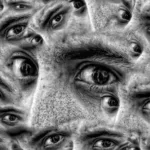
There are people who, when feeling frustrated for some reason, unconsciously carry out a ritualized action through which they try to reduce their discomfort.
This this kind of behavior reflect a psychological phenomenon known as compulsion.
What are compulsions?
The idea of what compulsions are can be defined slightly differently according to two different psychological approaches: psychoanalysis born with Sigmund Freud and cognitive-behavioral psychology.
Compulsions according to psychoanalysis
The concept of compulsion was widely used in the field of psychoanalysis, and from this approach it was understood that its meaning was that of a repetitive behavior that is used to vent the frustration of not being able to satisfy desires that arise in the most unconscious and passionate of the mind.
In this way, compulsions would be ways to compensate for the impossibility of responding to an emotional desire while keeping the consciousness distracted and away from the true source of frustration. Thus, For the psychoanalytic approach, compulsion is a way of masking a need whose idea we try to repress so that it does not pass to the conscious part of the psyche.
But this deception does not correspond to reality, and in fact it is not effective in definitively ending the need, since it is a superficial and momentary fix; That is why this forbidden desire remains latent in the unconscious, and causes the compulsions to be repeated all the time.
Compulsions according to the cognitive-behavioral paradigm
According to this current of psychology, there is no conscious entity that tries to suppress content stored in another unconscious entity, so the definition of compulsion renounces these concepts. Thus, from this point of view, a compulsion is a behavior (such as stretching one’s hair or washing one’s hands) or a mental act (such as mentally repeating a word) that It becomes a repetitive ritual without necessarily leading to a clear purpose. of which the person is aware.
Over time, compulsions can be repeated so frequently that they significantly damage the person’s quality of life by preventing them from carrying out normal plans and tasks in their daily lives.
Causes
As we have seen, the definition of what a compulsion is changes significantly depending on which current we pay attention to. From current psychology, however, it is considered that the psychoanalytic concept of compulsion is not useful, since it does not allow hypotheses to be subjected to experimentation; That is why the second is dominant.
According to the concept of compulsion used by the cognitive-behavioral current, the cause of this phenomenon is due to a maladaptive association. That is to say, compulsions are the result of learning that tries to respond to a feeling of discomfort that occurs regularly and that is just as bad or worse than what it wants to combat, since it is repeated all the time and causes The person does not feel well if he does not carry out a series of very determined and rigid steps.
The role of obsessions
It is considered that that unpleasant stimulus that makes the person perform compulsions repeatedly is something called obsession. An obsession is an idea or a mental image (that is, an idea that, rather than being communicated with words, is more visual) that is unbearable or too intrusive.
For example, you may think very frequently of a scene that causes a lot of shame, or you may think of a photograph that is disgusting.
These obsessions appear without prior warning and without the person wanting it, and generate discomfort. Compulsion is the improvised strategy that is carried out to try to reduce discomfort. Unfortunately, Over time the compulsion becomes as uncontrollable and unpredictable as the obsession.because as it has been repeated it has become totally associated with it. This mechanism is the basis of Obsessive-Compulsive Disorder.
Symptoms in cases of compulsion
These are some of the most frequent symptoms related to compulsions and Obsessive-Compulsive Disorder. It must be taken into account that if there is no feeling of inability to control these actions and if a worsening of the quality of life is not perceived due to them, it is premature to consider that compulsions occur. In any case, the diagnosis must be made by clinical psychologists or other professionals specialized in such types of practices within the health system.








